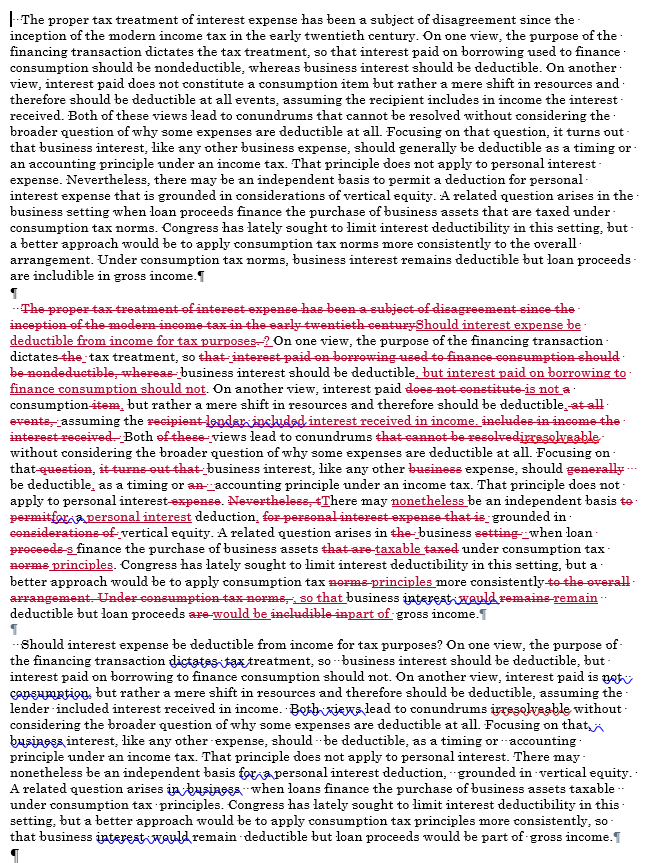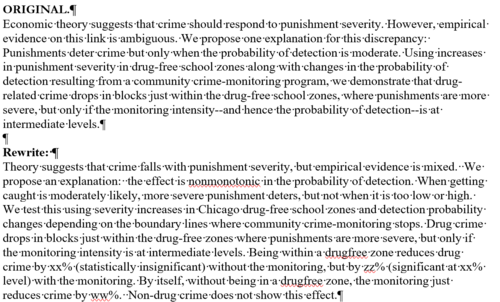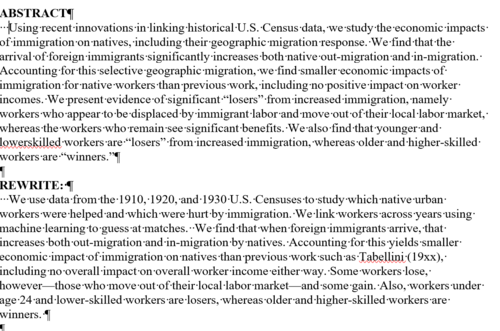Difference between revisions of "Examples of Rewriting Abstracts"
(→Introduction) |
|||
| (2 intermediate revisions by the same user not shown) | |||
| Line 1: | Line 1: | ||
| − | + | ==Introduction== | |
| + | I like to rewrite abstracts, because I can understand the paper better then, and help the author that way too. Please don’t be offended; I rewrite my own papers this way too. | ||
| + | |||
| + | A good exercise for you is to try to rewrite each of these, and then to compare with what I did. I ought to look them up and put the originals into text form ot make this easier for you; maybe someday I'll do that. This is how the very good writer Benjamin Franklin learned to write, he tells us in his [https://www.gutenberg.org/cache/epub/20203/pg20203-images.html ''Autobiography:'' ] | ||
| + | {{Quotation| | ||
| + | About this time I met with an odd volume of the ''Spectator.'' It was the third. I had never before seen any of them. I bought it, read it over and over, and was much delighted with it. I thought the writing excellent, and wished, if possible, to imitate it. With this view I took some of the papers, and, making short hints of the sentiment in each sentence, laid them by a few days, and then, without looking at the book, try'd to compleat the papers again, by expressing each hinted sentiment at length, and as fully as it had been expressed before, in any suitable words that should come to hand. Then I compared my ''Spectator'' with the original, discovered some of my faults, and corrected them. But I found I wanted a stock of words, or a readiness in recollecting and using them, which I thought I should have acquired before that time if I had gone on making verses; since the continual occasion for words of the same import, but of different length, to suit the measure, or of different sound for the rhyme, would have laid me under a constant necessity of searching for variety, and also have tended to fix that variety in my mind, and make me master of it. Therefore I took some of the tales and turned them into verse; and, after a time, when I had pretty well forgotten the prose, turned them back again. I also sometimes jumbled my collections of hints into confusion, and after some weeks endeavored to reduce them into the best order, before I began to form the full sentences and compleat the paper. This was to teach me method in the arrangement of thoughts. By comparing my work afterwards with the original, I discovered many faults and amended them; but I sometimes had the pleasure of fancying that, in certain particulars of small import, I had been lucky enough to improve the method of the language, and this encouraged me to think I might possibly in time come to be a tolerable English writer, of which I was extremely ambitious.}} | ||
| + | |||
| + | ---- | ||
| + | |||
| + | ==Examples== | ||
[[File:Abstract1.png|500px|frame|left|A tax law abstract]] | [[File:Abstract1.png|500px|frame|left|A tax law abstract]] | ||
[[File:Abstract2.png|500px|thumb|left|An economics of crime abstract]] | [[File:Abstract2.png|500px|thumb|left|An economics of crime abstract]] | ||
| + | |||
| + | [[File:Abstract3.png|500px|thumb|left|An Economics of Immigration Abstract]] | ||
Latest revision as of 18:50, 25 November 2021
Introduction
I like to rewrite abstracts, because I can understand the paper better then, and help the author that way too. Please don’t be offended; I rewrite my own papers this way too.
A good exercise for you is to try to rewrite each of these, and then to compare with what I did. I ought to look them up and put the originals into text form ot make this easier for you; maybe someday I'll do that. This is how the very good writer Benjamin Franklin learned to write, he tells us in his Autobiography:
About this time I met with an odd volume of the Spectator. It was the third. I had never before seen any of them. I bought it, read it over and over, and was much delighted with it. I thought the writing excellent, and wished, if possible, to imitate it. With this view I took some of the papers, and, making short hints of the sentiment in each sentence, laid them by a few days, and then, without looking at the book, try'd to compleat the papers again, by expressing each hinted sentiment at length, and as fully as it had been expressed before, in any suitable words that should come to hand. Then I compared my Spectator with the original, discovered some of my faults, and corrected them. But I found I wanted a stock of words, or a readiness in recollecting and using them, which I thought I should have acquired before that time if I had gone on making verses; since the continual occasion for words of the same import, but of different length, to suit the measure, or of different sound for the rhyme, would have laid me under a constant necessity of searching for variety, and also have tended to fix that variety in my mind, and make me master of it. Therefore I took some of the tales and turned them into verse; and, after a time, when I had pretty well forgotten the prose, turned them back again. I also sometimes jumbled my collections of hints into confusion, and after some weeks endeavored to reduce them into the best order, before I began to form the full sentences and compleat the paper. This was to teach me method in the arrangement of thoughts. By comparing my work afterwards with the original, I discovered many faults and amended them; but I sometimes had the pleasure of fancying that, in certain particulars of small import, I had been lucky enough to improve the method of the language, and this encouraged me to think I might possibly in time come to be a tolerable English writer, of which I was extremely ambitious.


